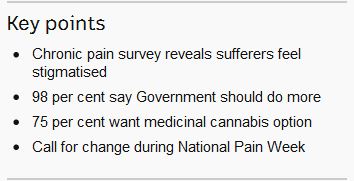Chronic pain sufferers 'not believed', with most saying they face stigma over the condition
by Hospital + Health | Hospital Equipment and Medical Products Suppliers Directory on 20-Jan-2019

In the past 10 years Kirsty Buhlert-Smith estimates she's spent $150,000 trying to treat her chronic pain, but like many in her position it's a daily struggle to have people even believe there's something wrong.
A new survey by Chronic Pain Australia, released on Monday, revealed 86 per cent of sufferers reported facing stigma or negative attitudes to what is often dubbed a "silent" or "invisible" problem. "It's been challenging. At times it's been horrendous. At times I've really lost hope," Ms Buhlert-Smith said. Her pain is caused by a complex neurological disorder and manifests itself as chronic pain in her lower back, neck and shoulder. She attributes the disorder to a number of factors: strenuous training as a young ballet dancer, her physical work as a physiotherapist, and a 100-kilometre trek a number of years ago. "It's put significant strain on my relationships, significant financial strain in my life and it's really affected all parts of my life," Ms Buhlert-Smith said.
"Imagine what it would be like to live with pain for every second of every minute of every hour of every day for the rest of your life … The mental weight of that can be devastating."
Ms Buhlert-Smith manages the pain through a combination of medication and therapies, but later this year will undergo surgery to have an intravenous infusion of ketamine for pain relief. Despite having private health insurance, she estimates she spends about $15,000 a year on treatment for her chronic pain and mental health issues. She has had to stop hands-on work as a physio and dropped back to just one day of work a week. And yet, she said there were times where she's struggled to be heard or have people believe something was wrong. "It can be such a silent condition," she said. "It's difficult for people to conceptualise an ongoing condition when the original injury has healed, so to speak."
Sufferers 'feeling like criminals'
The Chronic Pain Australia survey found Ms Buhlert-Smith wasn't alone in her struggle to be heard. Of more than 1,200 chronic pain sufferers surveyed, more than 86 per cent reported facing stigma or negative attitudes because of the condition. Some participants said they felt treated like drug addicts and "doctor shoppers" while seeking pain relief, and others said they were told by their doctors the pain wasn't as bad as they said. Others were tired of friends downplaying their pain and another said they received dirty looks when they parked in disabled car parks because they didn't have an obvious physical impairment.
"People don't recognise the seriousness and extent of my daily pain. They assume I'm making it up, or being a sissy," one respondent said.
"People think I'm faking my pain," said another. "[I've been] told by friends, family or my boss, 'But you don't look sick'," said another. Among the other key findings of the survey are 98 per cent of recipients saying the Federal Government wasn't doing enough to assist people living with chronic pain, with some calling for greater funding for services and better access to the disability support pension. And 87 per cent found accessing health professionals was prohibitively expensive. Meanwhile, 75 per cent of respondents want their GP to be able to prescribe medicinal cannabis for pain relief.
Chronic Pain Australia president Coralie Wales cited recent research published in the esteemed Lancet medical journal that showed cannabis does not reduce chronic pain, but said respondents were still looking for options. "For many people living with 24/7 pain, current medical options come with side-effects that can be quite disabling in themselves," she said. "Overwhelmingly they want access to other options.
"What we're hearing is that people living with chronic pain want simpler access, without feeling like criminals."
This week is National Pain Week, and Chronic Pain Australia is calling on health professionals to be more considerate of patients and think about their needs before planning treatment initiatives. "Feeling unsupported by the Government, and being discriminated against, judged or not believed by friends, family and work colleagues can make their situation even more difficult to cope with," Dr Wales said.
Source: ABC News Breakfast









